
JOURNAL OF GASTROENTEROLOGY
Scope & Guideline
Innovating insights for improved patient outcomes.
Introduction
Aims and Scopes
- Clinical Gastroenterology and Hepatology:
The journal publishes original research on clinical aspects of gastroenterology and hepatology, including studies on liver diseases, inflammatory bowel diseases, gastrointestinal cancers, and functional gastrointestinal disorders. - Endoscopic Techniques and Innovations:
There is a strong emphasis on advancements in endoscopic procedures, including new technologies, techniques, and their clinical applications in diagnosis and treatment of gastrointestinal disorders. - Microbiome and Gastrointestinal Health:
Research exploring the relationship between the gut microbiome and gastrointestinal health is a significant focus, encompassing studies on dysbiosis, its implications on diseases, and potential microbiome-targeted therapies. - Patient Outcomes and Quality of Life:
The journal aims to address the impact of gastrointestinal diseases on patient quality of life, focusing on outcomes related to treatment efficacy, patient-reported outcomes, and healthcare utilization. - Translational and Basic Research:
It includes studies that bridge the gap between basic and clinical research, particularly those investigating the molecular mechanisms of gastrointestinal diseases and potential therapeutic targets.
Trending and Emerging
- Artificial Intelligence and Machine Learning Applications:
The integration of AI and machine learning in gastroenterology is on the rise, with studies focusing on improving diagnostic accuracy, predicting treatment outcomes, and optimizing clinical workflows. - Personalized Medicine and Targeted Therapies:
There is a growing emphasis on personalized treatment strategies, particularly in inflammatory bowel disease and liver diseases, highlighting the importance of genetic and molecular profiling. - Nutrition and Gut Health:
Research exploring the role of diet and nutrition in gastrointestinal health is increasingly prominent, particularly in relation to obesity, metabolic syndrome, and inflammatory bowel diseases. - Long-COVID and Gastrointestinal Implications:
Emerging studies are focusing on the gastrointestinal manifestations and complications related to long-COVID, reflecting a timely response to the ongoing pandemic's impact on health. - Telemedicine and Remote Patient Management:
The rise of telemedicine as a viable option for managing gastrointestinal disorders is notable, with research focusing on patient outcomes, satisfaction, and adherence in remote care settings.
Declining or Waning
- Traditional Pharmacological Treatments:
There has been a noticeable decline in studies focused solely on traditional pharmacological treatments for gastrointestinal disorders, as the focus shifts towards biologics and novel therapies. - Surgical Interventions:
Research on surgical techniques and outcomes related to gastrointestinal diseases appears to be waning, possibly due to a growing preference for less invasive endoscopic approaches. - Epidemiological Studies on Viral Hepatitis:
The frequency of epidemiological studies specifically investigating viral hepatitis has decreased, potentially overshadowed by more pressing concerns such as chronic liver disease and obesity-related liver conditions. - Conventional Diagnostic Techniques:
There is a decreasing trend in research centered on conventional diagnostic methods (e.g., standard imaging techniques), as newer methodologies such as AI-assisted diagnostics gain traction. - Gastrointestinal Manifestations of Rare Diseases:
Research on gastrointestinal complications related to rare systemic diseases seems to be less frequent, as the focus shifts towards more prevalent conditions and their management.
Similar Journals

DIGESTION
Connecting researchers with groundbreaking discoveries in digestion.DIGESTION is a prestigious journal dedicated to advancing the field of gastroenterology, published by KARGER, a renowned publisher based in Switzerland. With a rich history dating back to 1896, this journal has continuously evolved and serves as a vital platform for researchers, professionals, and students alike. DIGESTION is recognized for its scholarly contributions, holding an impressive rank of 23 out of 167 in the Scopus database, placing it within the top 14% of gastroenterology journals, as evidenced by its Q2 classification. The journal's commitment to high-quality research is reflected in its wide-ranging scope, addressing various aspects of digestive health, clinical practices, and innovative therapies. Though not an open-access journal, it provides comprehensive access options that ensure the dissemination of crucial research findings to the global community. As we move towards 2024, DIGESTION continues to facilitate dialogue and insights in gastroenterological research, making it an indispensable resource for those in the field.
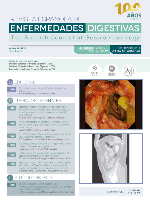
REVISTA ESPANOLA DE ENFERMEDADES DIGESTIVAS
Unveiling insights into digestive diseases.REVISTA ESPANOLA DE ENFERMEDADES DIGESTIVAS, a pivotal Open Access journal published by ARAN EDICIONES, S A, has been at the forefront of advancing the field of gastroenterology since its inception in 1990. With a robust commitment to disseminating high-quality research, the journal provides a platform for researchers, clinicians, and students to share innovative findings and insights concerning digestive diseases. The journal is characterized by its Q3 ranking in both Gastroenterology and Miscellaneous Medicine categories, indicative of its significant contributions to these fields, and is positioned within the 36th percentile of Scopus rankings for medicine related to gastroenterology. Based in Spain, REVISTA ESPANOLA DE ENFERMEDADES DIGESTIVAS has embraced the Open Access model since 2004, ensuring that its articles are readily available to a global audience without financial barriers. The journal not only supports academic discourse but also plays a crucial role in improving clinical practices and health outcomes related to digestive health.
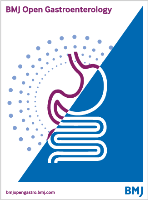
BMJ Open Gastroenterology
Advancing Gastroenterology Through Open Access ResearchBMJ Open Gastroenterology is a premier open access journal published by the esteemed BMJ Publishing Group, focusing on the dynamic and evolving field of gastroenterology. Established in 2014, the journal has rapidly ascended in stature, reflected in its impressive 2023 Q1 ranking in gastroenterology and its position within the top 25% of journals in the category according to Scopus. With a mission to disseminate high-quality, peer-reviewed research with global significance, the journal provides a vital platform for researchers, professionals, and students alike to share their findings and advancements in gastrointestinal medicine. Operating from its headquarters in London, England, the journal's open access format ensures wide visibility and accessibility of cutting-edge research, making it an invaluable resource for those dedicated to improving patient care and driving innovation in gastroenterological sciences. By engaging with this journal, contributors and readers can stay at the forefront of critical developments in the field, fostering a collaborative environment for knowledge exchange.
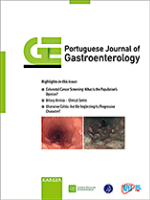
GE Portuguese Journal of Gastroenterology
Empowering Global Collaboration in GastroenterologyThe GE Portuguese Journal of Gastroenterology, published by KARGER, is a prominent platform in the field of gastroenterology, providing a vital forum for the dissemination of high-quality research since its establishment. With an open access model implemented in 2012, the journal ensures that emerging findings in gastrointestinal health are readily accessible to a global audience, facilitating the exchange of critical knowledge among researchers, practitioners, and students alike. Based in Switzerland, this journal has earned a respected position within the academic community, currently holding a Q3 ranking in the gastroenterology category for 2023, alongside a Scopus rank of #113 out of 167 in its field. Spanning converged years from 2014 to 2024, the GE Portuguese Journal of Gastroenterology aims to bridge gaps in research and practice, fostering collaboration and innovation across diverse areas within the discipline. Authors and readers alike benefit from the journal's commitment to advancing knowledge and practice in gastroenterology.

WORLD JOURNAL OF GASTROENTEROLOGY
Exploring innovations in gastroenterology.WORLD JOURNAL OF GASTROENTEROLOGY, published by BAISHIDENG PUBLISHING GROUP INC, stands at the forefront of gastrointestinal research, providing a critical platform for the dissemination of high-quality studies in the field. With an impressive impact factor reflected in its Q1 rankings in both Gastroenterology and Miscellaneous Medicine, this journal is recognized for its rigorous peer-review process and commitment to advancing knowledge and practices related to digestive health. Covering comprehensive scopes from clinical advancements to innovative therapies, the journal serves an essential role for researchers, clinicians, and students, enabling them to stay updated on the latest developments and findings from 1998 through 2024. The open access model facilitates broader accessibility, ensuring that groundbreaking research reaches a global audience. The journal's ranking within the top 15% of Scopus demonstrates its significant contribution to the academic community, making it a valuable resource for advancing the science of gastroenterology.

GUT
Elevating Gastroenterology Through Rigorous ScholarshipGUT is a premier journal in the field of gastroenterology, published by the esteemed BMJ Publishing Group. With a rich history dating back to 1960 and an impressive convergence of research expected to continue through 2024, GUT has established itself as a cornerstone of academic discourse in the gastrointestinal sciences. The journal boasts a remarkable impact factor, positioning it in the Q1 category for gastroenterology with an outstanding rank of #3 out of 167 in its Scopus ranking, reflecting its 98th percentile status among peers. Although it does not currently offer open access options, GUT remains dedicated to disseminating high-quality research, reviews, and clinical studies that advance the understanding of digestive health. Published in the United Kingdom, GUT serves as an essential resource for researchers, clinicians, and students aiming to stay at the forefront of innovations and developments in the field.

Gut and Liver
Exploring breakthroughs in gastrointestinal and liver diseases.Gut and Liver is a prestigious peer-reviewed journal dedicated to advancing the fields of Gastroenterology and Hepatology. Published by the EDITORIAL OFFICE GUT & LIVER in South Korea, this Open Access journal has been disseminating valuable research findings since 2007, making critical knowledge accessible to a global audience. With an impressive 2023 impact factor that places it in Q1 rank in both Gastroenterology (#28/167) and Hepatology (#22/82), it is recognized as a leader in the medical domain. The journal covers diverse topics, including innovative therapeutic strategies, clinical practices, and groundbreaking research in liver diseases and gastrointestinal disorders, thereby playing a vital role in improving patient care and outcomes. Researchers, healthcare professionals, and students can benefit from the journal's wealth of information, designed to foster collaboration and spark new ideas within the scientific community. For further engagement with current research, readers can access issues from 2009 to 2024 and stay updated on the latest advancements in the field.
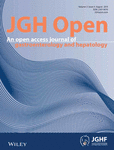
JGH Open
Empowering the Future of Gastrointestinal MedicineJGH Open is a prominent open-access journal dedicated to advancing knowledge in the fields of Gastroenterology and Hepatology, published by WILEY. Since its inception in 2017, the journal has served as a crucial platform for researchers, professionals, and students to disseminate innovative research findings and clinical insights. With an impact factor and Scopus rankings reflecting its steady growth—ranking in the 3rd quartile for both Gastroenterology (Q3) and Hepatology (Q3)—JGH Open is positioned within the competitive landscape of medicine. Its commitment to open access enhances the visibility and accessibility of high-quality research, ensuring that significant advancements in understanding diseases of the gastrointestinal tract and liver reach a broad audience. With a focus on collaboration and dissemination of knowledge, JGH Open aims to contribute to the global discourse and improve outcomes in gastrointestinal health.

Gastroenterology
Transforming Clinical Practices with Cutting-Edge StudiesGastroenterology, published by W B Saunders Co-Elsevier Inc, is a premier journal dedicated to advancing the knowledge and practice within the fields of gastroenterology and hepatology. Established in 1945 and covering a wide range of topics related to digestive health, this journal holds a distinguished position in the academic community, as evidenced by its impressive Q1 status in both Gastroenterology and Hepatology categories, and its high rankings (4th in both disciplines) in Scopus, placing it in the top percentile for scholarly impact. With its commitment to publishing high-quality research, reviews, and clinical studies, Gastroenterology provides an essential resource for researchers, healthcare professionals, and students seeking cutting-edge insights that inform clinical practices and enhance patient care. Although it does not currently offer open access, the journal continues to serve as a vital platform for disseminating meaningful research that shapes the future of digestive disease management.
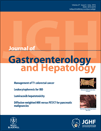
JOURNAL OF GASTROENTEROLOGY AND HEPATOLOGY
Driving excellence in gastrointestinal and liver disease studies.Welcome to the JOURNAL OF GASTROENTEROLOGY AND HEPATOLOGY, an esteemed publication in the field of gastroenterology and hepatology, proudly published by WILEY. Established in 1986, this journal serves as a crucial platform for researchers, healthcare professionals, and students, presenting groundbreaking research and comprehensive reviews that drive advances in understanding and treating gastrointestinal and liver diseases. With a strong reputation evidenced by its Q1 ranking in gastroenterology and Q2 ranking in hepatology, this journal ranks impressively in the Scopus metrics - positioned at #22 out of 167 in gastroenterology and #21 out of 82 in hepatology, reflecting its contribution to scholarly excellence. Although it does not offer open access options, the journal’s rich archive and diverse topics make it indispensable for those dedicated to improving patient outcomes in these critical areas of medicine. Whether you are a seasoned researcher or an aspiring medical professional, engaging with this journal will keep you at the forefront of the latest developments and emerging trends in gastroenterology and hepatology research.